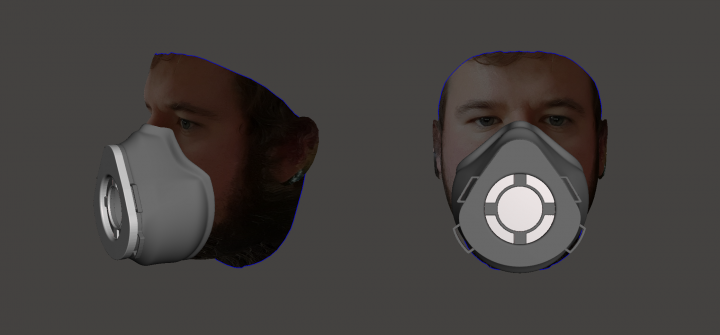Bespoke, reusable facemasks made using smartphones and 3D printers could help better protect people during future epidemics or further waves of Covid-19, new research suggests.
Computer simulation of a reusable facemask produced by the School of Engineering
Engineers have devised a system to create personalised facemasks for healthcare workers that include 3D-printed components designed using photos taken with smartphones.
The approach could offer a cheaper and more sustainable alternative to single-use facemasks, which do not always fit properly and were in short supply during the first wave of the pandemic, researchers say.
Hospital settings
The team – which also includes plastic surgeons, speech therapists and virologists – designed their system to utilise 3D scanners and printers available in hospitals.
Researchers carried out a pilot trial with 66 volunteer healthcare workers from NHS Lothian.
Mask production
The team generated 3D images of participants’ faces using either a precision scanner or three pictures taken with a smartphone. Using a computer programme, this information was then used to create moulds that precisely matched the contours of individuals’ faces.
The moulds were 3D-printed and used to make mask components made of silicone. The team assembled the final product using additional plastic parts and a filter section.
While masks could be made using scanners or smartphone images, being able to capture pictures remotely would be beneficial during a pandemic when social distancing and remote working is commonplace, the team says.
Effective protection
Researchers found that their masks provided the same level of protection as available single-use versions. Bespoke masks also tended to fit better, with almost 90 per cent of volunteers wearing them passing a face fit test, compared with only 76 per cent of those using single-use masks.
Further tests showed that the reusable facemasks could be safely decontaminated using common household detergents – such as washing-up liquid – and cleaning materials used routinely in hospitals.
The trial was funded by the Chief Scientist Office (CSO)’s Rapid Research in Covid-19 programme.
“With this funding from the CSO,” said Dr Adam Stokes from the School of Engineering, “our team was able to design a new custom-fit and reusable facemask, to conduct a clinical trial, and to run virology assays for disinfection protocols. This project lays the groundwork for reusable PPE products that reduce the environmental impact from masks going to landfill, that enable resilience in the UK supply chain, and that meet the highest FFP3 standards as required by front line healthcare workers.
This team drew on our expertise from engineering, clinical practice, and the private sector and we have developed, rapidly, a proven technology that could prove vital in saving lives and protecting the planet.”


